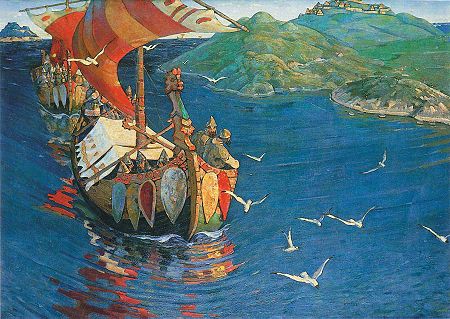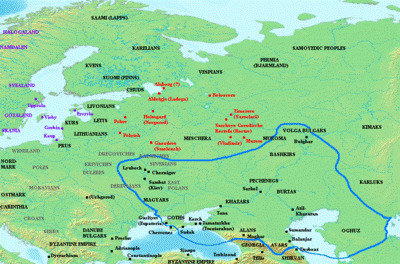
Guests from Overseas, Nicholas Roerich (1899)
Rus'

Guests from Overseas, Nicholas Roerich (1899)
The Rus' (Slavic: Русь, Swedish: Ros, Greek: Ῥῶς) were a group of Varangians (according to the so called Normanist theory, the Vikings of predominantly Swedish origin). According to the Primary Chronicle of Rus, compiled in about 1113 AD, the Rus had relocated from the Baltic region ("from over the sea"), first to Northeastern Europe, creating an early polity which finally came under the leadership of Rurik. Later, Rurik's relative Oleg captured Kiev, founding Kievan Rus. The descendants of Rurik were the ruling dynasty of Rus (after 862), the successor principalities of Galicia-Volhynia (after 1199), Chernigov, Vladimir-Suzdal, Grand Duchy of Moscow, and the founders of the Tsardom of Russia.
Their name survives in the designation Rospigg, a person from the coastal area of Uppland, Sweden, called Roslagen, literally "the land of rowing", and the cognates Russians, Rusyns and Ruthenians, giving their name to the land of Rus' as well as the ethnonym of its majority East Slavic population. Today, the Swedes are still designated in Finnish and Estonian as the Ruotsalaiset and the Rootslased, respectively.
History

Map showing Varangian settlements (in red) and location of Slavic tribes (in grey),
mid-9th century Khazar influence indicated with blue outline
The name Rus, like the Finnish name for Sweden (Ruotsi), is derived from an Old Norse term for "the men who row" (rods-) as rowing was the main method of navigating the rivers of Eastern Europe, and that it is linked to the Swedish coastal area of Roslagen (Rus-law) or Roden, the origin of the Varangians, according to the Russian Primary Chronicle. The name Rus would then have the same origin as the Finnish and Estonian names for Sweden: Ruotsi and Rootsi.
The Varangians left a number of rune stones in their native Sweden that tell of their journeys to what is today Russia, Ukraine Greece, and Belarus. Most of these rune stones can be seen today, and are a vital and foretelling piece of historical evidence. The Varangian runestones tell of many notable Varangian expeditions, and even account for the fates of individual warriors and travelers.
The Vikings had some enduring influence in Rus, as testified by loan words, such as yabeda "complaining person" (from aembaetti "office"), skot "cattle" (from skattr "tax") and knout (from knutr, "a knotty wood"). Moreover three Nordic names of the first Varangian rulers also became popular among the later Rurikids and then among the East Slavic people in general: Oleg (Helgi), Olga (Helga) and Igor (Ingvar).

Longships Are Built in the Land of the Slavs , Nicholas Roerich (1903)